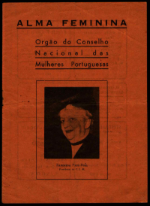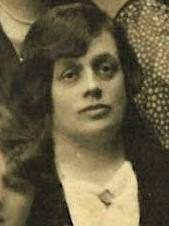
The Conselho Nacional das Mulheres Portuguesas (National Council of Portuguese Women) was a feminist organization founded in 1914. [1]

The Conselho Nacional das Mulheres Portuguesas (National Council of Portuguese Women) was a feminist organization founded in 1914. [1]
The first attempt to found a Women’s Council in Portugal was at the beginning of the 20th century, when Carolina Michaëlis de Vasconcelos endeavoured to "bring together some ladies who speak English - and who wish to collaborate in the feminist movement" in order to meet a visiting Canadian feminist, Sophia Sanford. The idea was to try to form a National Council of Portuguese women, but the meeting was unsuccessful. Subsequently, the Conselho Nacional das Mulheres Portuguesas (CNMP) was founded on 30 May 1914, at the initiative of the politician and writer, Magalhães Lima, and the activist and gynecologist Adelaide Cabete, who was appointed president. Carolina Michaëlis de Vasconcelos was invited to be honorary president. [2]
The official bulletin of the Council, published in November 1914, stated that it aimed "to bring together, in a large association, all the associations and female groups that are spread throughout the country", putting an end to "alienation from the international feminist world". Its main objectives were the improvement of the legal situation of women in the family and in the State; the right to votes for women; the end of trafficking and exploitation of women; the improvement of public health; the defence of the rights of pregnant women and women who had recently given birth; and the protection of disadvantaged and abused women and children. Despite the Council’s apolitical approach, the fact that several prominent members of the Republican League of Portuguese Women, which advocated the overthrow of the monarchy, were part of the CNMP prevented the participation of more conservative, and, in general, more affluent women. As a consequence, the organization was short of funds and its headquarters, for most of its existence, were in the doctor’s office of Adelaide Cabete and her sister, Maria Brazão in Lisbon. However, in 1914 and 1915, there were fifteen affiliated associations. [2]
To celebrate the tenth anniversary of its foundation, the Council organized the First Feminist and Education Congress in Lisbon in May 1924, which was inaugurated by the President of the Republic, Manuel Teixeira Gomes. Twenty-five papers were presented, 17 by women. The proposals made in the presentations were very advanced for the time, such as that the working woman should be entitled to a month of maternity leave; sex education should be given in schools; equal pay should be given for equal positions; women should have the vote; and that married women and men should have the same legal status. In the following year representatives of the Council spoke at several international conferences. The successful first Lisbon congress led to the decision to hold another in 1928, which discussed issues such as coeducation in primary schools, votes for women, and the need to ensure that a woman who became pregnant would not be sacked. [2] [3]
Throughout its life the Council communicated with its members through a bulletin. Initially known simply as the Bulletin of the Portuguese Women’s National Council, its name was changed to Alma feminina (The Feminine Soul) in 1917. It was changed again to A Mulher (The Woman) in 1946. The magazine was mainly concerned with publicizing the association's activities and initiatives promoted by international feminist and female organizations, as well as informing readers about the situation of women and the state of feminism in other countries. [2] [4] [5]

In 1930, on the initiative of journalist Maria Lamas, the council organised an "Exhibition of Female Work, ancient and modern, of a literary, artistic and scientific nature", with the support of the newspaper O Século . The purpose of the exhibition was to give visibility to the work of women from all over the country. Its success raised the profile of the CNMP. However, during the 1930s and 1940s, with the emergence of women's associations associated with the authoritarian Estado Novo government, the Council faced challenges as the State wanted women’s organizations that it could control. [2]
Although Adelaide Cabete lived in Portuguese Angola from 1929 to 1934, she continued to serve as president. On Cabete’s death in 1935 Sara Beirão was elected president. She was followed by Isabel Cohen von Bonhorst in 1942, and Maria Lamas in 1945. In 1947, after holding the successful "Exhibition of Books Written by Women" at the National Society of Fine Arts (Sociedade Nacional de Belas Artes - SNBA) in Lisbon, the Conselho Nacional das Mulheres Portuguesas was banned by the Estado Novo and had to immediately cease its operations. Nevertheless, many of the Council's members continued to work to promote the rights of and better living conditions for Portuguese women, joining other associations that had not been banned. [2] [6]

Adelaide Cabete, was one of the main Portuguese feminists of the 20th century. A staunch Republican, she was an obstetrician, gynecologist, teacher, Freemason, author, philanthropist, pacifist, abolitionist, animal rights defender and humanist.

The Liga das Mulheres Republicanas was a Portuguese feminist organisation founded in 1909 by Ana de Castro Osório and Adelaide Cabete. It split in 1912 after the refusal of the government to pass a law enabling women to vote. Cabete subsequently started the Conselho Nacional das Mulheres Portuguesas.

Maria Lamas was a Portuguese writer, translator, journalist, and feminist political activist.

Clementina Carneiro de Moura (1898-1992) was a Portuguese teacher, modernist painter and promoter of traditional arts.
Sara Beirão was a Portuguese writer, journalist, women's rights activist and philanthropist. As an author, she is particularly known for fiction aimed at children and youth and for her work as publisher and editor of the Alma feminina feminist magazine.

Alma feminina was the official bulletin of Portugal's Conselho Nacional das Mulheres Portuguesas (CNMP) from January 1917 to 1946.
Elina Guimarães (1904-1991) was a writer and feminist leader in Portugal during the middle of the 20th century.

Deolinda Lopes Vieira was a primary school teacher as well as an anarcho-syndicalist activist and a feminist, who played an important role in Portugal's Conselho Nacional das Mulheres Portuguesas.

Vitória Pais Freire de Andrade was an active Portuguese feminist who played an important role in the Conselho Nacional das Mulheres Portuguesas in the 1920s. She is also known for her campaigning against bullfighting in Portugal.

Aurora Teixeira de Castro was vice-president in 1926 and 1927 of the feminist Conselho Nacional das Mulheres Portuguesas. She was a lawyer and notary and the first female notary in Portugal.

Maria Clara Correia Alves was a Portuguese feminist. She was one of the founders of the National Council of Portuguese Women in 1914 and both the Secretary-General of the Council and the editor of its newsletter from 1914 to 1920.

The Associação Feminina Portuguesa para a Paz was a female pacifist association created in 1935 and dissolved by the Esdado Novo dictatorship in 1952. It had active groups in Lisbon, Coimbra and Porto. Although declaring itself apolitical, many of its members were anti-fascists opposed to the Estado Novo. Its activities involved providing support to prisoners of war, and it organized lectures, exhibitions, and other events as a way to disseminate the principles of World Peace. In the last decade of its existence, it became increasingly opposed to the Government, in response to increased repression. The Association published an occasional Bulletin and had a children's choir, directed by Francine Benoît.

Abigail de Paiva Cruz was a Portuguese naturalist painter, sculptor, lace maker and feminist activist.

Maria Alda Nogueira (1923–1988) was a communist and feminist activist who opposed Portugal's Estado Novo regime and spent nine years as a political prisoner. After the overthrow of the Estado Novo she became a parliamentary deputy, serving in the National Assembly for a decade.
The Movimento Democrático de Mulheres is a Portuguese non-governmental women's association. It was created in 1968 by groups opposed to the Estado Novo regime and continued after the overthrow of the regime in 1974.

Eduarda Lapa was a painter and painting teacher who specialized in naturalist painting, especially still life, becoming known as the "flower painter" and the "ambassador of colours". An active feminist, she was the first woman to join the board of the Portuguese National Society of Fine Arts.

Beatriz Arnut, was a Portuguese writer, poet, civil servant and defender of women's rights.

Etelvina Lopes de Almeida (1916–2004) was a Portuguese writer, journalist, broadcaster and a deputy for the Portuguese Socialist Party (PS) in the Assembly of the Republic.

Maria Leontina Mendes Ferreira Cabral Hogan, also known as Leontina de Cabral Hogan was a Portuguese medium, spiritist, and feminist activist and member of the National Council of Portuguese Women.

Angélica Viana Porto was a Portuguese feminist, republican, pacifist and anti-dictatorship activist, recognized for her role during the first wave of the feminist movement in Portugal. She was active initially in the Liga das Mulheres Republicanas and then in the Conselho Nacional das Mulheres Portuguesas, where she served as vice-president and honorary president.